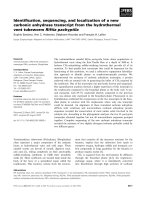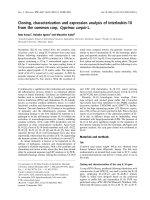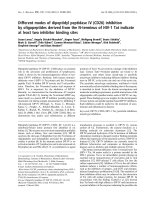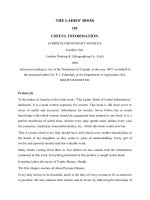Extracted from the 17th edition of Which MBA? docx
Bạn đang xem bản rút gọn của tài liệu. Xem và tải ngay bản đầy đủ của tài liệu tại đây (1.09 MB, 57 trang )
Which
MBA
George
Bickerstaffe
The following is
extracted from the
17th edition of
Which MBA? The full
version includes details on
different delivery methods,
such as part-time, distance-
learning and executive MBAs.
It also provides in-depth
profiles of 122 business
schools, including full
breakdowns of schools'
rankings.
The book is available from the
Economist Intelligence Unit
store at
Pearson Education Limited
Edinburgh Gate, Harlow, Essex CM20 2JE
Website:
The Economist Intelligence Unit
The Economist Intelligence Unit is a specialist publisher serving companies establishing and managing
operations across national borders. For over 50 years it has been a source of information on business
developments, economic and political trends, government regulations and corporate practice worldwide.
The EIU delivers its information in four ways: through our digital portfolio, where our latest analysis is updated
daily; through printed subscription products ranging from newsletters to annual reference works; through
research reports; and by organising conferences and roundtables. The firm is a member of The Economist Group.
London New York Hong Kong
The Economist Intelligence Unit The Economist Intelligence Unit The Economist Intelligence Unit
15 Regent Street The Economist Building 60/F, Central Plaza
London 111 West 57th Street 18 Harbour Road
SW1Y 4LR New York Wanchai
United Kingdom NY 10019, US Hong Kong
Tel: (44.20) 7830 1000 Tel: (1.212) 554 0600 Tel: (852) 2585 3888
Fax: (44.20) 7499 9767 Fax: (1.212) 586 1181/2 Fax: (852) 2802 7638
E-mail: E-mail: E-mail:
Website:
Electronic delivery
This publication can be viewed by subscribing online at
Copyright
© 2005 The Economist Intelligence Unit Limited. All rights reserved. Neither this publication nor any part of it
may be reproduced, stored in a retrieval system, or transmitted in any form or by any means, electronic,
mechanical, photocopying, recording or otherwise, without the prior permission of the Economist Intelligence
Unit Limited.
ISBN-13: 978-0-273-70627-4
ISBN-10: 0-273-70627-6
British Library Cataloguing in Publication Data.
A catalogue of this publication is available from the British Library.
The authors of EIU Research Reports are drawn from a wide range of professional and academic disciplines. All the
information in the reports is verified to the best of the authors’ and the publisher’s ability, but neither can accept
responsibility for loss arising from decisions based on these reports. Where opinion is expressed, it is that of the
authors, which does not necessarily coincide with the editorial views of the Economist Intelligence Unit Limited
or of The Economist Newspaper Limited.
10 9 8 7 6 5 4 3 2 1
09 08 07 06 05
Printed and bound in Great Britain by Ashford Colour Press Ltd., Gosport.
Which MBA? © The Economist Intelligence Unit Limited 2005
Which skills will tomorrow’s leader need?
Extracted from the 17th edition of Which MBA?
Which skills will tomorrow’s leader need?
There are three basic steps when planning your management education:
● deciding which skills will help you perform better in your career both now and in the
future;
● settling on what type of MBA or executive education programme will deliver these skills in
a way that suits you best;
● finding the best place to take it.
Here we look at the first of these stages. If management education is about acquiring a skill
or set of skills that will boost your performance in your current job, or make you more attrac-
tive to other employers, then knowing what the market is demanding will be the key to your
success.
Following are the results of a survey of a group of senior executives, asking what they will be
looking for in tomorrow’s leaders. They were asked which skills they were looking for in talent-
ed young managers and how these were likely to change over time; which skills were in short
supply; which methods of management education (for example, an MBA or short executive
education courses) would most effectively meet those needs; which providers of management
education were most important in developing managers; and many other questions.
By studying the results of the survey—and comparing them with a similar survey conducted
in 2004—you will get an idea of what companies, and therefore employers or recruiters, are
looking for in their managers and which providers of management education can best supply
this.
The idea that managers can develop all the skills they need through experience, and that
training has value only as an employee benefit, is becoming more and more outdated. Of the
executives surveyed, only 3% (a big decrease from 10% in 2004) saw little material benefit in
management education. Interestingly, however, the number saying that management educa-
tion is crucial in building the knowledge and skills of managers also fell compared with 2004,
from 34% to 30%. The big jump (28% compared with 37% in 2004) was among those saying
that education and training can be used to plug gaps in a manager’s experience. The lesson, it
seems, is that an MBA doesn’t make the man. Employers are looking primarily for someone
with the right personal qualities and see education as a way of bridging any skills gap.
Which MBA? © The Economist Intelligence Unit Limited 2005
Which skills will tomorrow’s leader need?
Extracted from the 17th edition of Which MBA?
Table 1.1
What role does management education and training play in developing your company's best talent?
(%)
2004 2005 % change
A manager can develop all of the skills he needs through experience, and management
education and training is useful only because staff perceive it as a benefit 10 3 –7
A manager can develop most of the skills he needs through experience, and the gaps
can be plugged through education and training 28 37 9
A manager can develop some of the skills he needs through experience, and the rest
can be developed through education and training 27 29 2
Management education and training is critical in building the knowledge and skills
of managers 34 30 –4
As for who is responsible for equipping a manager with those skills, it is clear that most exec-
utives (73%) think that the firm and the individual share equal responsibility. Only 6%
thought the company held the primary responsibility and 21% said it was mainly something
for the manager himself or herself to take action on.
But what are the skills that young managers must have? Top of the list, perhaps not surpris-
ingly, is honesty and integrity, which is given a rating of 82%. This is a little lower than
2004’s 86%: perhaps memories of corporate scandals such as Enron are starting to fade.
Next come communication skills (81%) and people skills (80%). As in 2004, the message
from firms is that they want their managers to excel in the soft skills, particularly leadership,
rather than the harder-edged technical and financial areas (perhaps because they already
assume managers will be skilled in these). A good understanding of technology and financial
knowledge, for example, are rated rather low at 61% and 58% respectively (virtually the
same as in 2004). Also as in 2004, previous managerial experience (57%) and management
education (54%) are not rated especially highly, although the latter has risen from 50% a
year ago.
Table 1.2
Who is more responsible for equipping a manager with necessary skills?
(%)
2004 2005 % change
The company 7 6 –1
The manager himself or herself 22 21 –1
Equal responsibility 71 73 2
Which MBA? © The Economist Intelligence Unit Limited 2005
Which skills will tomorrow’s leader need?
Extracted from the 17th edition of Which MBA?
Table 1.3
Which characteristics does your company currently look for in its most talented young managers?
(importance rating, %)
2004 2005 % change
Honesty and integrity 86 82 –4
Communication skills 80 81 1
Excellent people skills 81 80 –1
Innovativeness/openness to new ideas 78 77 –1
Strategic vision 75 70 –5
International knowledge/the ability to manage across cultures 63 67 4
Deep knowledge of market needs and operations 71 66 –5
A good understanding of technology 60 61 1
Dealmaking ability 63 60 –3
Functional knowledge of various parts of the business 59 60 1
Financial knowledge 58 58 0
Management experience 57 57 0
Management education 50 54 4
Table 1.4
In five years’ time, do you believe these characteristics will have gained or decreased in importance as
the qualities required of potential company leaders?
Increase/decrease in importance (–100 to +100)
Strategic vision +57
Excellent people skills +56
Deep knowledge of market needs and operations +36
Innovativeness/openness to new ideas +67
A good understanding of technology +27
International knowledge/the ability to manage across cultures +67
Honesty and integrity +29
Management experience +9
Functional knowledge of various parts of the business +7
Dealmaking ability +25
Communication skills +53
Financial knowledge +16
Management education +13
Furthermore, softer skills will remain high on the agenda of the executives surveyed. Asked
to assess those characteristics that will grow in importance over the next five years, the
majority opted for these rather than areas such as functional or financial knowledge. Com-
munications skills (53%), people skills (56%) and market knowledge (36%) were all rated as
likely to increase in importance over this period.
Providers of management education, particularly business schools, have not been slow to
react. Soft skills, particularly leadership, communications and ethics, have become integral
parts of the core (that is, required) curriculum of almost all MBA programmes. For example,
the University of Michigan’s Ross School of Business insists that all students fulfil require-
ments in ethics, law and communications, and the core of London Business School’s MBA
starts with a leadership module that also includes business ethics. The same is true of
Which MBA? © The Economist Intelligence Unit Limited 2005
Which skills will tomorrow’s leader need?
Extracted from the 17th edition of Which MBA?
executive education programmes, with many schools, such as Oxford University’s Saïd Busi-
ness School in the UK, offering open-enrolment strategic leadership programmes.
Even more of the executives predict growing importance for qualities that might be described
as relevant to the external realities of business. For example, in an increasingly international
and competitive business world, 67% say that innovativeness and openness to new ideas will
matter more in five years than they do now.
Coupled with this will be a need for strategic vision and, in particular, an ability to manage
effectively in the global marketplace. Of the executives surveyed, 67% thought that interna-
tional knowledge and the ability to manage across cultures would grow in importance, slight-
ly more than in 2004 (62%). However, the number believing that strategic vision will become
increasingly important has decreased to 57%, compared with 66% in 2004, perhaps reflect-
ing the realisation that, although important, it may be difficult for young managers, however
talented, to put into practice. By its nature strategic vision (in terms of an organisation as a
whole) is a matter for the top level of management, though no doubt younger managers will
be expected to demonstrate it in their own more limited environments.
Both trends reflect underlying realities. Globalisation, evident in such phenomena as
increased offshoring, shows no sign of slowing; indeed, it may well accelerate. Moreover,
rather than operating separate businesses in lots of countries, global firms are seeking to
integrate their many operations around the world seamlessly—hence the need for interna-
tional knowledge and the ability to cross cultures.
The emphasis on strategic vision, though somewhat lower, is symptomatic of a move away from
concentration on core businesses that has defined many firms’ priorities in the past decade.
Knowing what skills are likely to be required in the future by potential employers is helpful in
deciding which management education options to choose. Even more helpful is to get an
insight into what skills employers believe are in short supply: those that are considered rare
are obviously worth acquiring. When asked to identify the main skills shortages among their
company’s up-and-coming talent, executives rated dealmaking ability, strategic vision, and
international knowledge and cross-cultural ability as most rare. These are qualities that can be
hard to teach, but most business schools do make the effort. This is certainly true in executive
education programmes, where courses on negotiation and cross-cultural issues are common.
In MBA programmes, the emphasis is usually more on putting students in situations where
they have to develop these skills rather than trying to teach them directly. The common prac-
tice of creating multicultural groups with differing skills and skill levels is a good example.
Simply making such groups function inevitably involves dealmaking, negotiation and cross-
cultural issues.
About the survey
In March 2005 the Economist Intelligence Unit conducted an online survey of senior executives
asking them their views on what they thought the manager of the future would look like and the
role management education would play in equipping future managers with the skills they need.
Some 225 senior executives participated in the survey, including C-level executives (CEO, CFO,
etc), senior vice-presidents and directors in a variety of functional areas. There was a wide industry
spread, including manufacturing, professional services and healthcare. The annual revenue of the
companies involved ranged from under US$500,000 to more than US$8bn.
Which MBA? © The Economist Intelligence Unit Limited 2005
Which skills will tomorrow’s leader need?
Extracted from the 17th edition of Which MBA?
Table 1.5
Which of the following skills are most prevalent and which most lacking among your company's up-and-
coming talent?
(0 = extremely rare, 100 = extremely prevalent)
2004 2005 % change
Honesty and integrity 64 64 0
A good understanding of technology 54 59 5
Communication skills 54 55 1
Functional knowledge of various parts of the business 54 55 1
Management experience 50 53 3
Deep knowledge of market needs and operations 50 52 4
Financial knowledge 48 52 5
Excellent people skills 54 51 –3
Innovativeness/openness to new ideas 52 51 –1
Dealmaking ability 49 46 –3
Strategic vision 36 43 7
International knowledge/the ability to manage across cultures 42 42 0
Table 1.6
In which areas do you see the greatest shortfalls in managerial talent over the next five years?
2004 2005 % change
Strategic vision 57 59 2
International knowledge/the ability to manage across cultures 28 37 9
Excellent people skills 28 34 6
Innovativeness/openness to new ideas 25 32 7
Deep knowledge of market needs and operations 26 25 –1
Communication skills 24 22 –2
Honesty and integrity 17 16 –1
Dealmaking ability 16 15 –1
A good understanding of technology 19 14 –5
Management experience 16 14 –2
Functional knowledge of various parts of the business 16 10 –6
Financial knowledge 16 8 –8
When looking at where the greatest shortfall will be, strategy is by far the biggest concern.
Strategy has long been one of the core subjects taught by business schools, particularly on
MBA programmes, and it is curious that the executives surveyed expect a shortage of managers
with strategic vision. On the face of it, sending up-and-coming managers on an MBA or execu-
tive MBA programme might help address the shortfall. Such programmes are also likely to be
increasingly useful in providing international knowledge and teaching students about cross-
cultural management, predicted to be the second biggest shortfall. Business schools have paid
particular attention to internationalism over the past decade, hiring faculty from abroad,
recruiting overseas students and forming partnerships with schools in other countries.
13
Which MBA? © The Economist Intelligence Unit Limited 2005
Which skills will tomorrow’s leader need?
Extracted from the 17th edition of Which MBA?
Table 1.7
Which type of provider do you believe has the most important role to play in developing executives at
your company?
(%)
2004 2005 % change
Business school 35 42 7
Independent provider/consultant 22 25 3
In-house trainer 29 19 –10
Corporate university 14 15 1
Indeed, the survey shows that the executives who responded do have considerable faith in
business schools: 42% believe that they play the most important role in developing their
managerial talent. This is surprising, given that many executives criticise business schools
for failing to teach the business skills they require and for conducting research that they say
lacks relevance to "real" business. Even so, business schools come well ahead of the much-
vaunted "corporate universities", in-house trainers and consultants.
Table 1.8
Which of the following courses does your company employ in developing managers?
(%)
2005
MBA 30
EMBA 30
Executive programmes (open) 39
Executive programmes (tailored) 39
Executive programmes (consortia) 7
In-house training 74
The executives do not seem to putting their faith into practice, however. Only 30% of com-
panies use MBAs to develop their managers. This may be because an MBA, as opposed to the
other types of programmes mentioned here, is usually paid for by the individual rather than
the company. A large number (74%) use in-house trainers as the predominant means of
developing their managers, even though only 25% think they play the most important role.
One reason could be that this is an efficient and cost-effective way of training large numbers
of people in a fairly short time.
The good news for business schools is that executive education programmes, both open and
tailored, are well regarded, as are MBAs. Indeed, asked which types of management educa-
tion have delivered good value for their firm in developing talent, two of those provided by
business schools (MBA programmes and tailored executive education) were rated ahead of
in-house training and a third business school offering, the executive MBA, which had the
same score. This is a significant change from 2004, when executives said they regarded in-
house training as much better value than any business school offering. In 2004, in-house
training scored 67%, compared with 59% for tailored courses and MBA programmes and 52%
for executive MBAs.
14
Which MBA? © The Economist Intelligence Unit Limited 2005
Which skills will tomorrow’s leader need?
Extracted from the 17th edition of Which MBA?
It is difficult to determine exactly what this change reflects. It is true that business schools
have devoted considerable energy and resources to their executive education programmes in
the past few years (largely as a response to falling MBA applications). So there may be a per-
ception among company executives that these courses are better designed and organised,
more relevant to their needs and, simply, better value.
Table 1.9
In your experience, which of the following courses have delivered good value in developing talent at your
firm?
(0 = very little value, 100 = excellent value)
2004 2005 % change
MBA 59 62 3
EMBA 52 61 9
Executive programmes (open) 50 53 3
Executive programmes (tailored) 59 64 5
Executive programmes (consortia) 44 47 3
In-house training 67 61 –6
Which MBA? © The Economist Intelligence Unit Limited 2005
Extracted from the 17th edition of Which MBA?
Full-time MBAs
You can study an MBA full-time, part-time or by distance learning and all these options have
advantages and disadvantages. This chapter concentrates on full-time programmes.Other
delivery methods are discussed in the print edition of Which MBA?
Advantages and disadvantages
A full-time programme is what many prospective students regard as the “authentic” MBA
experience. Certainly it offers considerable advantages compared with other options. An MBA
is difficult. Doing it full-time at least gives you the opportunity to immerse yourself fully in
the programme with few distractions from the learning process and in a stimulating atmos-
phere. You normally have fairly easy access to teaching faculty without the problems often
associated with, say, a part-time evening programme where you and your teacher are eager
to get home. Moreover, as the accepted cliché is that you will learn at least as much from fel-
low students as from professors, having easy and frequent opportunities to meet, talk and
work with classmates is a big advantage.
Full-time programmes form the basis of the Economist Intelligence Unit ranking and they are
the only type of programme that delivers all four elements in our ranking criteria: career
opportunities; increased salary; networking; and personal development/education experi-
ence. Part-time and executive MBA students are often sponsored so the career/salary issues
are less important, and distance-learning students, by definition, find networking difficult.
Networking is one of the key benefits students look for in an MBA programme (see Table 2.1).
This is much easier on a full-time programme. As one of our student diarists points out (see
Student perspective), full-time students, particularly at a campus-based school, generally
work and play together and often form life-long friendships.
Of course, networks exist on other types of programme. Part-time and EMBA students spend
large amounts of time together and establish friendships. But the experience is on a slightly
lesser scale: less intensive and perhaps not as long lasting.
Table 2.1
Why did you decide to study for an MBA degree?
Full-time students, (%)
a
To open new career opportunities 36
Personal development 22
To increase salary 13
To further current career 12
Educational experience 9
Potential to network 6
Company advice or requirement 1
a
Importance accorded by students to each factor.
Which MBA? © The Economist Intelligence Unit Limited 2005
Full-time MBAs
Extracted from the 17th edition of Which MBA?
Full-time options (1-year, 2-year)
The duration of a full-time programme can be anything from a mere ten months to two years.
In the US most full-time programmes last two years, taught over four semesters (or some-
times eight mini-semesters) of about 13–14 weeks in the winter and spring of each year.
(Which means they do not actually last two years in total teaching time, just two calendar
years overall.) A variation on the semester system is trimesters, or three periods in each of
the two years (these are also sometimes referred to as terms or, confusingly, quarters).
There is much greater variety outside the US. Some leading schools, such as London Business
School and IESE in Barcelona, follow a two-year style programme, though with considerable
flexibility. For example, the LBS MBA lasts between 15 and 21 months and students can fin-
ish as early as December of the second year; IESE’s programme is completed in 19 months. At
INSEAD in France and IMD in Switzerland programmes last around ten months. The full-time
programme at Bocconi in Milan lasts 13 months, at RSM Erasmus University in Rotterdam 15
months and at Imperial (Tanaka) in London exactly 12 months.
US schools have also tinkered with their programmes to reduce the time taken to gain an
MBA. A number, such as Notre Dame (Mendoza), Florida (Warrington) and Emory (Goizueta),
offer accelerated one-year tracks for students who have studied business or related degrees
at undergraduate level. Students take a short top-up course in business fundamentals during
the summer and then go straight into the second year. However, there are no signs yet that
any of the top-ranked American schools, with the exception of Pittsburg (Katz), are about to
switch to one-year programmes. Indeed, Katz has introduced a much more traditional two-
year programme alongside its long-running one-year European-style MBA.
In the past, some schools have attempted to shorten programmes by allowing students to
continue to study straight through the summer. However, this caused problems because of
the importance American employers place on the summer internship (company placement).
Many job offers following graduation are conditional on successful internships and most US
schools now accept that a summer internship is essential for career success.
The classic two-year programme
The first year of a two-year programme is generally devoted to “core” courses. These deal
with the fundamentals of business, typically including finance, financial and managerial
accounting, human resources management, information management, macroeconomics and
microeconomics, marketing, organisational behaviour, production and operations manage-
ment, and quantitative analysis. Increasingly, though, in response to student demands,
schools offer one or two electives in the first year to allow earlier specialisation.
The second year often begins with a compulsory integrative (or “capstone”) course, fre-
quently based on business strategy, designed to pull together the first year’s work. Mainly,
though, students pursue their own interests or career objectives by taking optional subjects,
or electives. These, especially in the US, can be (or must be) grouped into specialisations,
often known as concentrations, that reflect functional areas such as finance or marketing or
even specific career goals. The longer the course, the more time students have to devote to
these. Most programmes also include in-company project work and softer elements such as
leadership, interpersonal skills and general personal development, either as courses in their
own right or as parallel workshops and seminars. Such two-year programmes, however, only
occasionally include the project-based thesis that is a feature of many one-year programmes,
Which MBA? © The Economist Intelligence Unit Limited 2005
Full-time MBAs
Extracted from the 17th edition of Which MBA?
particularly in the UK.
A required core and a range of electives are typical of virtually all MBA programmes, allowing
students considerable freedom to design an MBA tailored to their personal interests and
career objectives. The long summer vacation, modelled on university practice, is traditionally
the time for summer jobs, or internships, which are a means of gaining company experience.
This is particularly important for students who want to use an MBA to switch their career from
one functional area or industry sector to another. In theory an internship is not compulsory
(although some schools now make them a required and assessed part of their programme)
and students can just go on holiday; in any case few jobs last the whole vacation.
However, as mentioned above, internships are a crucial element in a two-year programme.
Many recruiters expect students to have served an internship with them if they are to offer a
job on graduation. As a result, most schools, especially in North America, put almost as much
effort into helping students find internships as helping them find a full-time job after gradu-
ation. A 2004 survey by the Graduate Management Admissions Council (GMAC) found that
31% of MBA graduates hired in 2004 had been interns at the companies where they found
full-time jobs. The percentage was even higher in the healthcare, manufacturing and finance
sectors. Interestingly, consultancy firms, perhaps because they have more experience in hir-
ing MBAs, were less likely than other sectors to hire interns. Only 19% of MBA graduates had
been interns at firms where they found a job.
The one-year-plus programme
Although so-called one-year programmes vary considerably in length, they are all extremely
intensive. Most of them follow the same core/elective framework as two-year programmes,
but because of time constraints the range of electives offered may be limited. In addition,
some schools, especially in the UK, include a lengthy in-company or research project that
also restricts the time allocated to teaching; in many, such as Oxford and Lancaster, at least
two months of the programme is taken up by off-campus research and thesis writing. Propo-
nents of one-year programmes argue that the time spent face-to-face with teaching staff dif-
fers little from two-year programmes, but their opponents respond that one year is not long
enough for issues to be covered comprehensively or in depth. It is certainly true that the
intense pressure of a one-year course is a good preparation for business life—where time
management and prioritising are essential skills—but the first year of a two-year programme
can be just as gruelling and effective.
Which MBA? © The Economist Intelligence Unit Limited 2005
Full-time MBAs
Extracted from the 17th edition of Which MBA?
What should be in an MBA programme?
The fundamentals of MBA programmes have remained remarkably constant over the years, but
business schools and MBA programme directors are no more immune from fads and fashions than
anyone else. At the end of the 20th century, for example, they reacted speedily to the dotcom
boom, hastily assembling courses on e-business and entrepreneurship and spending a great deal
of money to create incubators that would help students develop and market their own companies.
When the inevitable bust came, many of these initiatives were, needless to say, quietly dropped.
However, there are certain elements that must be present. They include initial functional or core
courses (such as finance, marketing and economics) and specialist analytical techniques (mainly
statistics), followed by more advanced courses or electives in one or more of the core areas. Soft
skills may be part of the core courses or taught in supplementary seminars and workshops. This is
essentially an American model (dating from the 1950s and earlier), aimed at enabling a general
manager to understand the work of functional specialists and how the various activities fit into the
business as a whole (or, as most students now use the degree, to allow a functional specialist to
become a general manager). Elective courses can produce specialists, but they will be specialists
who can understand the other functions of management.
There have been experiments with new approaches and variations on this theme, but the model
has proved remarkably robust. Below is a checklist of what an MBA programme should ideally
contain. Although developed by the Economist Intelligence Unit, this is not dissimilar from the
criteria used by the major international accreditation bodies (see page 31).
Checklist for an MBA programme
The programme should ideally contain the following:
● Pre-programme courses (optional or required) on quantitative methods, computing and
mathematics for students not already skilled in these areas.
● An orientation programme before the start of the first term to meet other students and members
of the faculty, and for team-building exercises.
● Solid grounding in core courses for general management.
● Waivers for existing skills (these are opposed by some schools).
●
A wide choice of electives that also allow in-depth specialisation. Some courses outside the
business school (for example, in other university departments) should be allowed and
encouraged.
●
Good international content, for example: course material, the number of foreign students and
teachers, visits overseas, the opportunity for language tuition and exchanges with foreign
schools.
● Reasonable emphasis on soft skills.
● A good range of company projects.
The schools should also provide the following:
● Good teaching skills and research and library facilities.
● A satisfactory programme of senior executives as guest speakers, “executives in residence” and
others.
● Reasonable open-door policy for access to faculty.
● An administration willing to respond to student concerns.
● Formal help with finding accommodation.
● Excellent careers services, including training in interview skills.
● A good and active network of alumni.
Which MBA? © The Economist Intelligence Unit Limited 2005
Full-time MBAs
Extracted from the 17th edition of Which MBA?
Cost
Counting the cost
No one can claim an MBA is cheap; studying it full time will cost you a great deal of money.
The full-time two-year MBA programme at Northwestern University (Kellogg) in the US, for
example, costs US$38, 844 per year, the 15-month full-time programme at RSM Erasmus in
the Netherlands costs €34,000 (US$50,000) and the 19-month programme at IESE in Spain
costs €58,900 (US$86,618). These figures are just what the schools charge for tuition, the
privilege of teaching you. You will also have to find the cash for rent, books and food—all
without the comfort of a regular salary cheque.
There are some general points about the cost of an MBA that are worth considering. For exam-
ple, in the US, business schools that are part of state universities can be considerably cheaper
than private institutions, with little effect on quality. Canadian schools also generally have
tuition fees lower than the North American average and offer good value for money. Most
schools in Europe are cheaper than their North American counterparts (largely because they
have shorter programmes), although there are exceptions. Even so, any good programme will
be expensive and will represent a significant investment in personal terms. Schools with less
prestige, but often excellent programmes, can be cheaper. Furthermore, different ways of tak-
ing an MBA can significantly affect the total price; for example, distance learning is generally
cheaper than part-time, which, in turn, is usually cheaper than full-time.
At many schools charges vary according to the origins of students. Foreign and (in North
America) out-of-state students can expect to pay more. In Europe, the differentiation is
often between residents and non-residents of the EU. The rationale is borrowed from the
undergraduate system, where the argument is that if taxpayers are being called upon to sub-
sidise studies, the benefit should be focused on local students, not all-comers. This is an odd
argument since in most countries postgraduate study is rarely subsidised. However, it should
be noted that in the US state residence may be awarded after one year to American nationals
and that the EU now includes 25 countries.
Costs for full-time students break down into three areas: tuition; living expenses; and for-
gone earnings. Note that tuition may not always include other business school expenses such
as textbooks, fees for the use of a gym and even such essentials as printing out pages from a
school computer. Good schools will make clear the scale of these additional costs.
Tuition
Tuition costs vary greatly between schools. At Georgetown University, for example, tuition
fees per year are currently US$33,960 and the school suggests a total yearly budget of a real-
istic US$55,450 for all expenses. McGill University in Montreal, Canada, charges foreign stu-
dents C$20,000 (US14,286) per year, but residents of Quebec state pay just C$1,668
(U$1,191) per year and other Canadians C$4,401 (US$2,980) per year. Minnesota (Carlson),
a public university, estimates total fees of US$19,820 a year for in-state residents and
US$28,200 for non-residents.
Although tuition in Europe has traditionally been somewhat cheaper, the current weakness
of the US dollar means that the comparative cost has risen. This means that, at the top
schools, the cost of a one-year European MBA can exceed that of two-year US one. At INSEAD
in France, for example, total tuition is €43,500 (US$63,971) and at IMD in Lausanne
Swfr75,000 (US$55,556).









